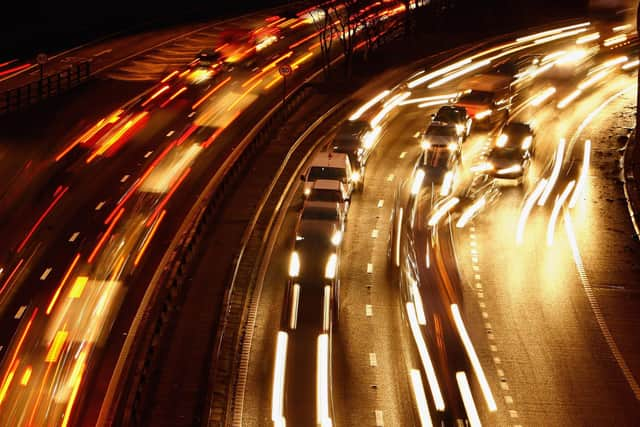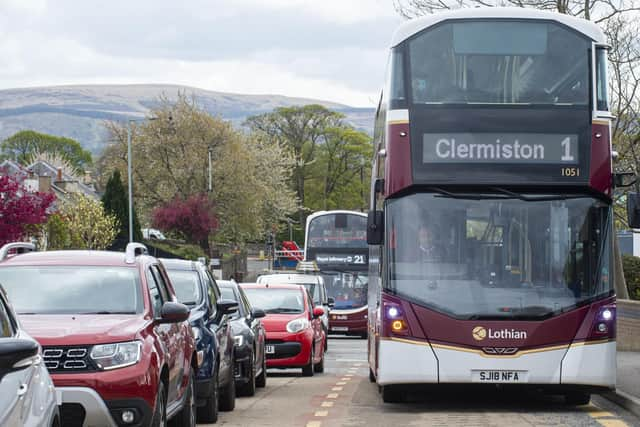Pay-as-you-drive charges and tolls among proposed new green taxes as pressure mounts on Scottish ministers to act on car use
The recommendations are among four priorities for “urgent” action, set out in a new report from the Climate Emergency Response Group (CERG) – a coalition of private, public and third-sector organisations focused on providing workable solutions to meet emissions targets.
The publication ups the pressure on Scottish ministers who are under increasing fire over a lack of progress towards climate change goals, with recent analysis suggesting efforts had “stalled”.
Advertisement
Hide AdAdvertisement
Hide AdThe group is now calling for First Minister Humza Yousaf to “show strong leadership” by ramping up emissions cuts to put the country back on track to reach net zero by 2045.
The call from CERG, which has previously had climate policy recommendations taken on board, comes ahead of the launch of the new Programme for Government (PfG) on Tuesday.
The new PfG, which will set out the actions that will be taken in the coming year and beyond, is expected to contain strengthened climate action.
CERG’s four recommendations are: introduce a Net Zero Test to inform policy and investment decisions; enable councils to unlock finance for climate action; bring in fiscal levers as part of a strategy to reduce car reliance and improve places for people; and support retrofit and green home heating schemes in every Scottish city.
The group says immediate Scottish Government action on these priority areas will simultaneously tackle the climate and cost-of-living crises.


CERG steering group member Stefanie O’Gorman, director of sustainable economics at architecture and engineering firm Ramboll, said: “The rapid scale-up of action must start now.
“Every delay increases the social, economic and environmental costs of the just transition to net zero, as well as costs of adapting to climate impacts like increasing severity of storm events and overheating of buildings and floods.”
In the section about transport, the report states: “The Scottish Government must show strong political leadership by introducing and enabling the use of fiscal levers – such as road-user charging, road pricing, parking controls and levies – needed to deliver on its world-leading commitment to reduce car kilometres and reduce transport emissions.”
Advertisement
Hide AdAdvertisement
Hide AdIt acknowledges that some car travel will always be essential – particularly for people with disabilities and those living in places with limited transport options.


But it contends that hitting drivers in the pocket would help rebalance the cost of motoring versus other transport modes; end transport poverty and inequality; and generate revenue to improve public and active travel services.
The Scottish Government has set out a commitment to achieve a 20 per cent reduction in car kilometres by 2030.
But Neil Greig, the Scotland-based policy and research director of the IAM RoadSmart motoring group, has advised caution over charges that would unfairly hit Scots – particularly those in remote parts of the country.
“Any new taxes must be operated on a UK-wide basis, otherwise they end up just being an extra cost to Scottish drivers,” he said.
“The Scottish Government have no control over fuel duties, vehicle excise duty (car tax) or VAT on electricity.
“Road-user charging in Scotland would therefore always be in addition to the taxes set by Westminster and that is unfair and damaging to the economy, particularly in rural areas.
“No one is happy with extra costs during a cost-of-living emergency and it is always the poorest who end up paying the most because they have older cars or can’t afford to go electric.
Advertisement
Hide AdAdvertisement
Hide Ad“Fiscal levers should also provide alternatives that make sense to those paying new taxe – eg cheaper and more reliable public transport, more park-and-ride options or safe cycling facilities.
“New charges that come with clear promises to use the money to improve active travel infrastructure, fill in potholes or deliver bus and rail services that drivers might actually use might be more palatable.
“However, long-suffering drivers have little trust in government of any type to spend the money on transport of any kind.”
A spokesman for Transport Scotland described the 2030 target for cutting car-usage as “a truly world-leading commitment”, with work under way to finalise the route map.
He said: “As outlined in our route map, the scale of the challenge means that we need to take forward a broad combination of interventions, including infrastructure, incentives and regulatory actions, taking into account the needs of people in rural areas and people on low incomes to help ensure a just transition to net-zero.
“To achieve this, the Scottish Government will work with all local authorities to support equitable measures which discourage car use to accompany greater investment in public transport and active travel for a fairer and greener transport system.”